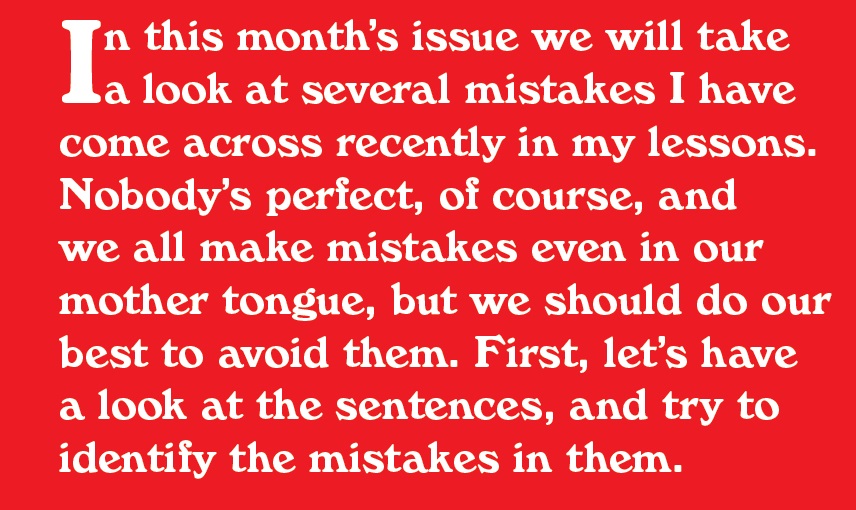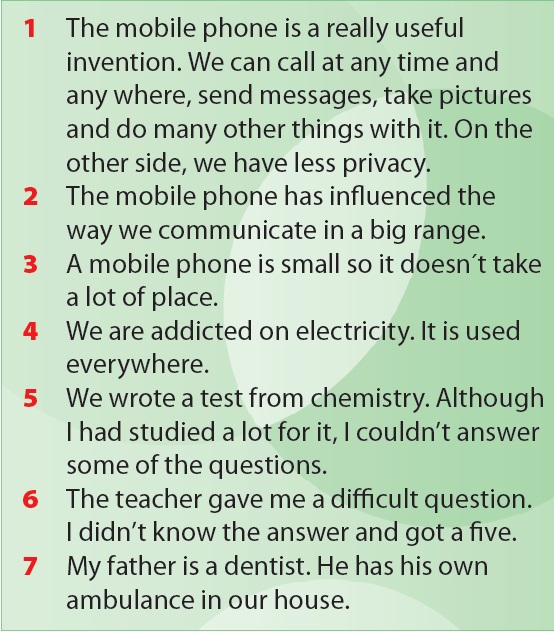
![]()
![]() On the other hand, we have less privacy (not ‘on the other side’). The phrases on the one hand and on the other hand are used t
On the other hand, we have less privacy (not ‘on the other side’). The phrases on the one hand and on the other hand are used t o introduce opposite points of some ideas or opinions. We can leave out the word ‘hand’ if we use both the phrases, like in this example: On the one hand, I’d like to have my own children, but on the other (hand), I don’t want to give up my freedom.
o introduce opposite points of some ideas or opinions. We can leave out the word ‘hand’ if we use both the phrases, like in this example: On the one hand, I’d like to have my own children, but on the other (hand), I don’t want to give up my freedom.
![]() The noun range has several different meanings. Here are some examples of its use: The hotel offers a wide range of facilities. It’s not easy to find a house in our price range. The gun has a range of 10 kilometres. However, when we want to express how large, important, serious, etc., something is, we should use the structure to…extent (to a great/large/certain/some, etc. extent). So, our correct example sentence should read like this: The mobile phone has influenced the way we communicate to a large extent.
The noun range has several different meanings. Here are some examples of its use: The hotel offers a wide range of facilities. It’s not easy to find a house in our price range. The gun has a range of 10 kilometres. However, when we want to express how large, important, serious, etc., something is, we should use the structure to…extent (to a great/large/certain/some, etc. extent). So, our correct example sentence should read like this: The mobile phone has influenced the way we communicate to a large extent.
![]() There are two mistakes in the sentence. The nouns place and space seem similar to us, but they are not interchangeable. place = a particular point, building, area, town, city, etc.
There are two mistakes in the sentence. The nouns place and space seem similar to us, but they are not interchangeable. place = a particular point, building, area, town, city, etc.
This is the place where I first met my wife. space (also room) = an amount of a place that is empty.
There’s plenty of space/room for everybody. Secondly, the verb is incomplete in the original sentence. Something or somebody takes up some space/room. One more thing which is not a mistake but a matter of preference – when using negatives, native speakers prefer to use much/many to a lot of, e.g., ‘I don’t have much time to talk to you. I’m terribly busy,’ or ‘I don’t know many people here, but I have a few close friends.’
So finally, here is the correct and possibly a more natural sentence: A mobile phone is small so it doesn’t take up much space.
![]() When somebody is addicted to something (not: addicted on something), he/she is unable to stop using something or doing something that is a habit. Some people are addicted to drugs or gambling, for example. When we need something or somebody in order to survive or be successful, we are dependent on it/ him/her, e.g., children are dependent on their parents, and we are dependent on electricity, because it is used everywhere. The adjective dependent can be used in the meaning of addicted (to be dependent on drugs, gambling, etc.), but the adjective addicted cannot be used in the meaning of dependent (children are not addicted to their parents). There is also an adjective with a similar spelling – dependable (that canbe relied on to what you want or need; it is synonymous with “reliable”). When you fi nd somebody who is dependable, you can rely on him/her.
When somebody is addicted to something (not: addicted on something), he/she is unable to stop using something or doing something that is a habit. Some people are addicted to drugs or gambling, for example. When we need something or somebody in order to survive or be successful, we are dependent on it/ him/her, e.g., children are dependent on their parents, and we are dependent on electricity, because it is used everywhere. The adjective dependent can be used in the meaning of addicted (to be dependent on drugs, gambling, etc.), but the adjective addicted cannot be used in the meaning of dependent (children are not addicted to their parents). There is also an adjective with a similar spelling – dependable (that canbe relied on to what you want or need; it is synonymous with “reliable”). When you fi nd somebody who is dependable, you can rely on him/her.
![]() You can do/sit (for)/take a test/an exam; the verb ‘write’ is used before a test/an exam in our languages, but not normally in English. The preposition ‘from’ is also incorrect here. We use in before the school subjects examined, as in ‘a test/exam in maths/biology/history’, etc. Alternatively, we can simply say/write ‘a maths/biology/ history test.’ All in all, the original sentence should have read as follows: ‘We took a test in chemistry,’ or ‘We took a chemistry test.’ One more thing – we use the preposition on when we want to specify the topic tested, as in ‘a test on the Second World War’, or ‘an exam on chemical compounds’.
You can do/sit (for)/take a test/an exam; the verb ‘write’ is used before a test/an exam in our languages, but not normally in English. The preposition ‘from’ is also incorrect here. We use in before the school subjects examined, as in ‘a test/exam in maths/biology/history’, etc. Alternatively, we can simply say/write ‘a maths/biology/ history test.’ All in all, the original sentence should have read as follows: ‘We took a test in chemistry,’ or ‘We took a chemistry test.’ One more thing – we use the preposition on when we want to specify the topic tested, as in ‘a test on the Second World War’, or ‘an exam on chemical compounds’.
![]() This is again a typical example of an incorrect word-for-word translation of a certain phrase. You can ‘ask somebody a question’ or, more formally, ‘address/put a question to somebody’. You don’t normally ‘give somebody a question’ in English. That’s why the correct sentence should be: The teacher asked me a diffi cult question.
This is again a typical example of an incorrect word-for-word translation of a certain phrase. You can ‘ask somebody a question’ or, more formally, ‘address/put a question to somebody’. You don’t normally ‘give somebody a question’ in English. That’s why the correct sentence should be: The teacher asked me a diffi cult question.
![]() As far as I know, an ambulance is a vehicle used for taking ill or injured people to a hospital. I suppose dentists don’t normally need/use an ambulance, do they? So the student’s father more probably has his own surgery (BrE) / office (AmE) in their house.
As far as I know, an ambulance is a vehicle used for taking ill or injured people to a hospital. I suppose dentists don’t normally need/use an ambulance, do they? So the student’s father more probably has his own surgery (BrE) / office (AmE) in their house.
Daniel Miklošovič

